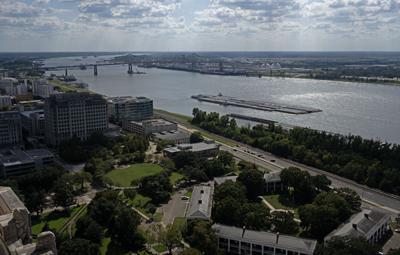The construction of another Mississippi River bridge south of Baton Rouge continues to face significant hurdles.
Completed studies are raising more questions about the proposed bridge, delaying the environmental review process at the same time as a group of Iberville landowners vocally opposes a potential bridge corridor that threatens an old-growth cypress forest.
When they came before the exasperated commissioners of the Capital Area Road and Bridge District, project leaders announced that the review under the National Environmental Policy Act, or NEPA, will likely occur later than planned. Now the review process will likely be initiated sometime in late summer, rather than the July 11 start that was originally scheduled.
The answer to when a new bridge could be operational continues to shift. The most recent estimate — given in April — is 2033.
“It’s just something always delaying the project,” Iberville Parish President Chris Daigle said at a district meeting Monday. “And here we are again.”
If completed, the bridge would be a third crossing point for the Mississippi River in the Baton Rouge area. The three potential placements for the bridge are located in Iberville Parish.
The bridge is estimated to cost $2 billion, with just under $400 million currently accounted for, according to Christina Brignac, project manager with the Louisiana Department of Transportation and Development.
Brignac said findings from land and grade analyses, as well as concerns about maintaining neighborhoods’ access to La. 1 and La. 30, moved back the NEPA start date. She said DOTD and Atlas, a consulting firm hired for the project, want to be able to articulate how they plan to mitigate potential impacts before initiating NEPA.
Once NEPA begins, DOTD will have 12 months to prepare the environmental assessment, she said. If the Federal Highway Administration determines the project carries significant environmental impacts, that will trigger a more time-consuming process called an environmental impact statement.
“I understand your frustration,” Brignac said to the commissioners. “Trust me, we’re working through how to move this project forward efficiently.”
Former DOTD secretary Joe Donahue expressed frustration that the line and grade analyses were submitted so close to July 11, the original NEPA start date, and that mitigating measures weren’t planned for ahead of time.
“I think that it was understood at the time that this was undertaken initially and Atlas was put under contract, that those tie-ins and the impacts of the controlled access (of La. 1 and La. 30) would have to evaluated and mitigations potentially identified,” Donahue said. “Just like President Daigle, I’m a little bit at a loss to understand what it was that pushed out the schedule.”
Commissioners also fielded public comment from residents of Plaquemine Point, a river swamp in Iberville Parish containing a rare old-growth cypress forest. Landowner and environmental advocate Laura Comeaux expressed opposition to the process that narrowed down the potential bridge placements to three options, saying that the outcome was “predetermined” by DOTD and parish leaders.
She referenced a comment from former Iberville Parish President J. Mitchell Ourso during public meetings in 2022. The Plaquemine Post South reported Ourso as saying, “The consultants know where the final three are, but because of the federal regulations they had to go through the process of community meetings to prove they don’t leave off anything that’s required.”
Comeaux also argued that public comment was not properly incorporated into the pre-NEPA phase. Her statements were met with applause from the audience of fellow landowners and environmentalists.
“Something has to be documented in that NEPA analysis-to-be to legally take all of these documents and this information that we have provided and make it part of the federal public record,” Comeaux said.
Donahue said he disagrees with the Plaquemine Point residents’ legal analysis, but that their overall concerns will be included in the environmental assessment.
“I don’t think that you’re running up against a brick wall,” Donahue said. “You’ve got open ears and an open mind in considering the concerns that you’ve raised.”
